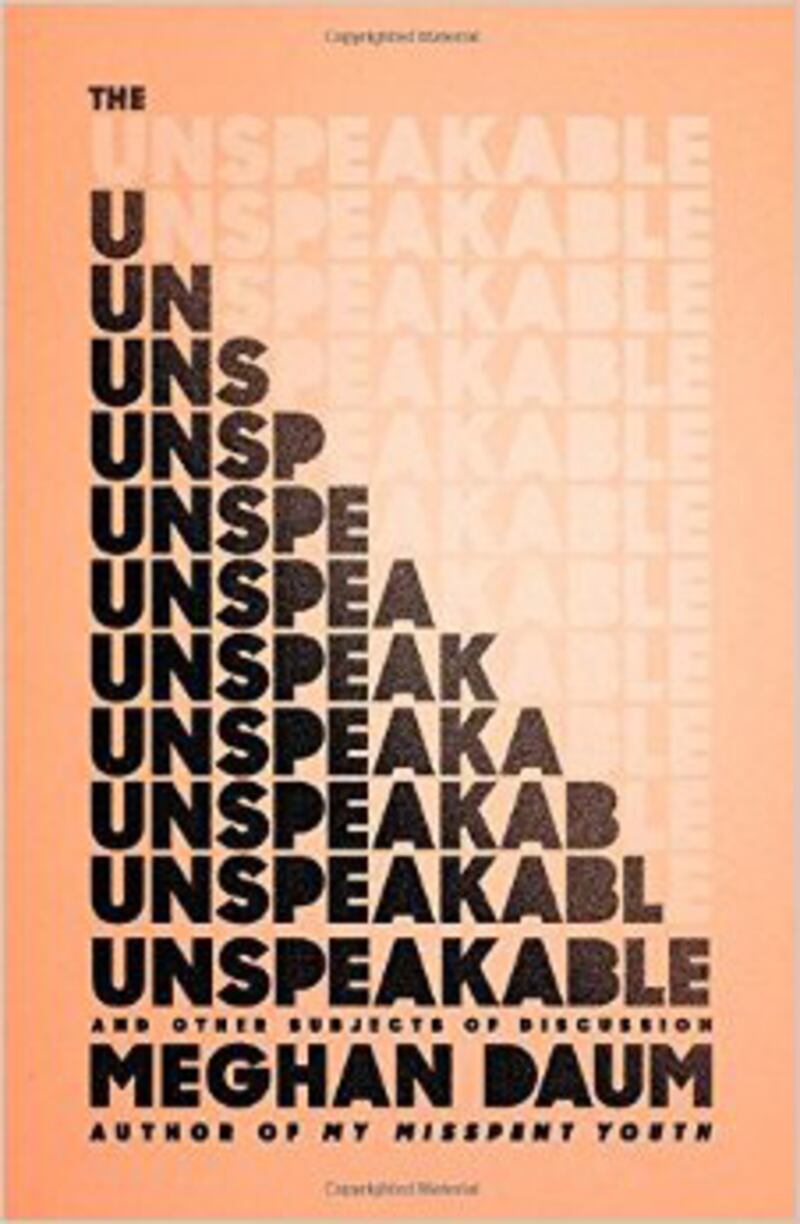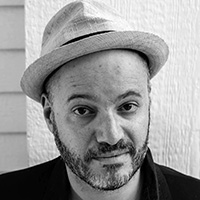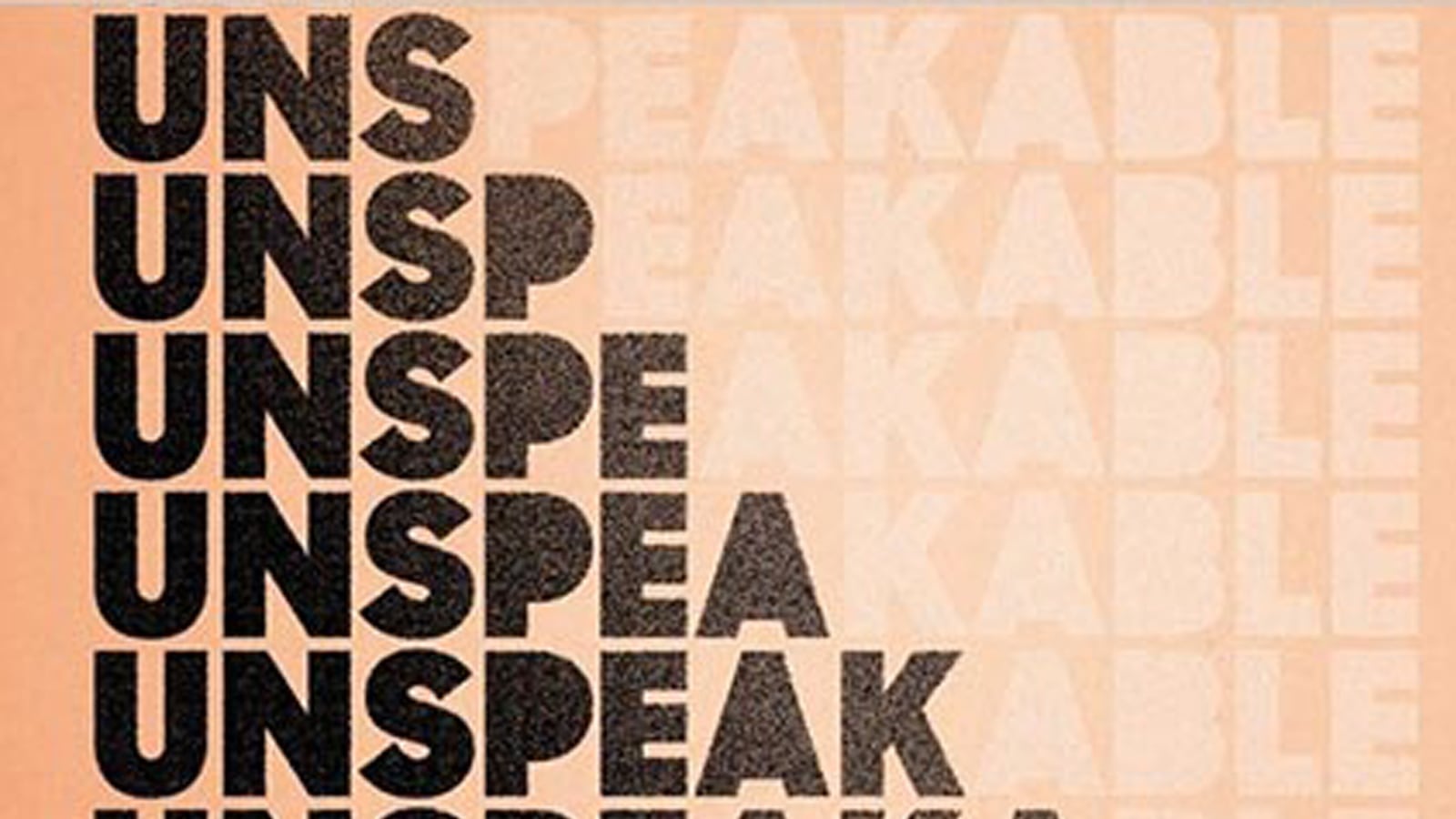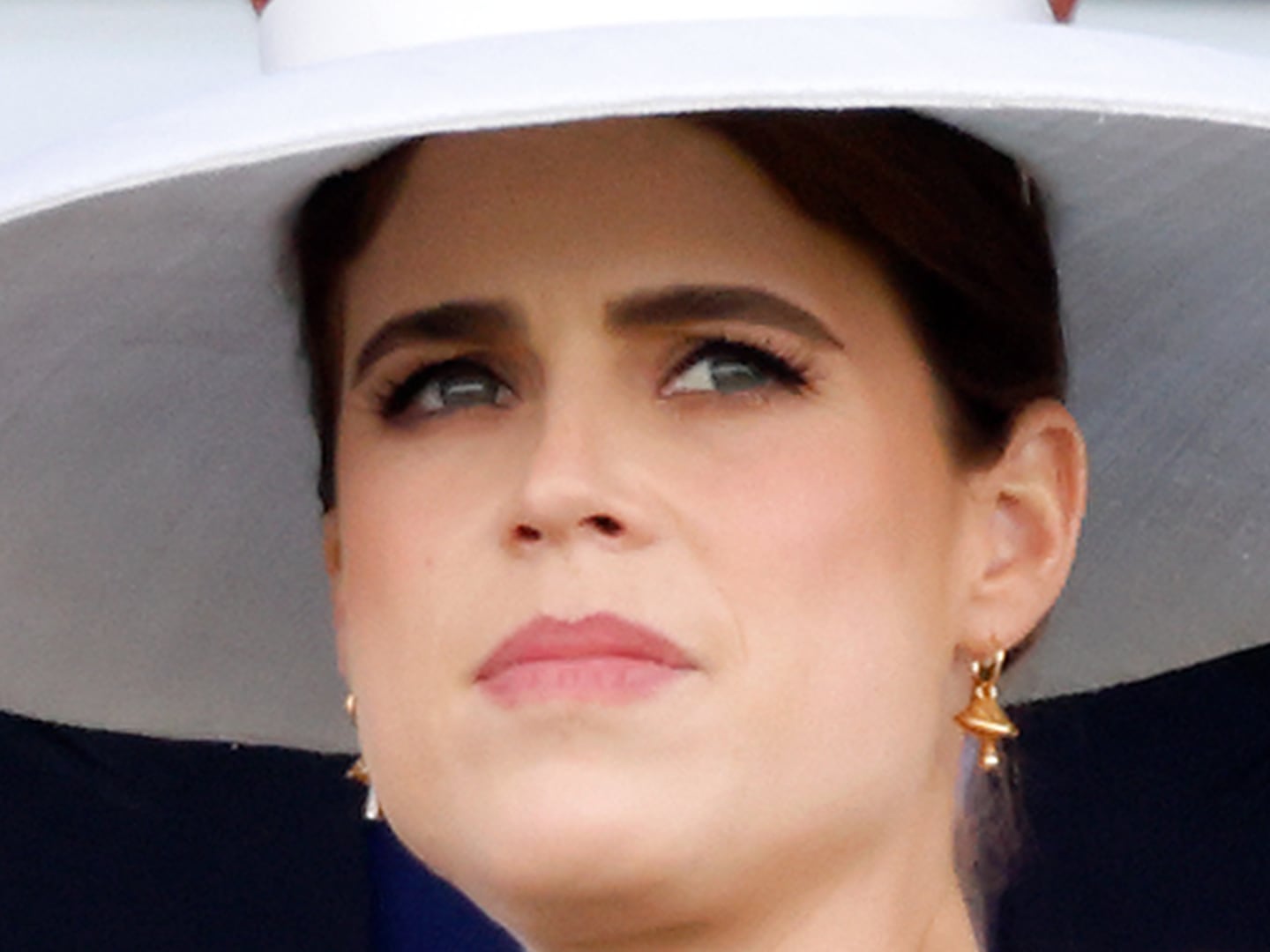The Unspeakable, Meghan Daum’s essay collection, reclaims longform essays in an age of click bait. She writes on illness, aging, and death, while also ruminating on celebrity and being a committed Joni Mitchell fan—all with a voice at invites you in with big ideas and real emotions. Daum provokes us to think, to rethink, and to feel. The modern essay is at least as old as Montaigne, and yet Daum’s essays continue to be reborn, even as print is imperiled and attention spans are shrinking. The word “essay” comes from the French “essayer,” meaning, “to try.” If these essays, like all essays, are a form of trying, Daum incites her readers to try, too. She spoke to The Daily Beast with her inimitable candor.
The Daily Beast: You received an MFA in Creative Writing from Columbia. Were you defining yourself as a fiction writer then, or did you already envision writing essays like the ones in The Unspeakable?
Daum: I started off doing fiction in 1993. It didn’t occur to me to do nonfiction because it wasn’t a thing yet. So I was bumbling around, writing short stories, and then I took a nonfiction workshop, and I realized that this was what I was supposed to do. That workshop was with the late Jane Howard. She was a real ‘60s-‘70s journalist. She wrote for LIFE magazine and would go on Johnny Carson to promote her books. She was so great and it made everything click for me, because I was also interested in journalism. So combining my journalistic and more creative instincts was the way to go. The essays in The Unspeakable are personal essays. I make a distinction between personal essays and memoir, which is a personal distinction, not one I would impose upon others.
When you think of your exemplars, do you think of other essayists or do you think of all kinds of influences?
I’m influenced by all kinds of things. I first read Joan Didion in my early 20s, and that totally changed everything. I realize what an obvious example this is. A young female essayist saying they’re influenced by Joan Didion is like a young female singer-songwriter saying they’re influenced by Joni Mitchell. It’s something that got in my ear. The way Joan Didion wrote was the equivalent to Joni Mitchell’s alternate tunings. I thought, “Whoa! You can do that? That’s allowed?” That was my feeling in first reading Didion. So that was a revelation. I was interested in the way that she allowed herself and was allowed to put sentences together in a particular way and let her logic take her in a particular direction. It’s easy to fetishize the stuff in Slouching Towards Bethlehem and The White Album and the whole New Journalism era. Everything was longer, editing was different, not like these short bits we have today. People are interested in a particular kind of personal essay right now, but maybe MFA students are interested in the Didions of the world and then there are a bunch of readers who like what’s on the Huffington Post.
Who else influenced you besides Joan Didion?
I love E.B. White’s essays, I love Joseph Mitchell’s Up In the Old Hotel. That’s classic stuff. Terry Castle has this great book called The Professor, which came out after I was in grad school. I loved Woody Allen’s short pieces. I was equally influenced by Woody Allen and Norman Mailer. I was very into this idea of being high-low, of being serious and intellectual but also making a really broad jokes. I was enamored of New York City intellectual life and was really into Philip Roth, because I was raised by self-loathing Midwesterners who were from southern Illinois, who felt like fish out of water when they came to the East Coast when I was a kid. When I came to New York after college I was taken with the world of Jewish intellectuals and the Upper West Side.

Was Lorrie Moore an influence?
Oh, yeah. I was writing Lorrie Moore knock-off short stories before I switched to nonfiction.
Well, I was sometimes reminded of Lorrie Moore’s balance of wit and deep emotion. I know that you have a balance of lighter and heavier pieces here…
…I tried to, yes…
…but I got hung up on the heavier pieces.
Yeah. These pieces were written over the past three years. I was writing about being in this place where you’re not young and you’re not old. So the heaviness was not so much a literary conceit but something I wanted to talk about.
As Joni Mitchell sang, “I am not old, I’m told / But I am not young / And nothing can be done.”
I love that song.
Your opening essay, “Matricide,” lives up to the book’s title of being unspeakable.
Yes.
You write about your mother having an apartment near Lincoln Center that she couldn’t afford, and it made me think of your 1999 essay “My Misspent Youth,” where you write about your fetish for an Upper West Side apartment that you couldn’t afford.
Well, she stole everything I did! I wrote a whole book called My Life Would Be Perfect If I Lived in That House and I dedicated it to my mother, because I’m obsessed with real estate and interior spaces, and I got that directly from her. I have no separation from my mother’s identity when it comes to real estate. She always had beautiful houses, so it paid off, even if she had to pay a little extra.
But you do have quite a bit of resentment towards her.
Our relationship was complicated and a whole story has never been told. It was impossible to convey the entire dynamic. It was a legacy of not knowing how to be a family, not knowing how to be a person, not knowing how to be a mother, a daughter. The most unspeakable thing, the unspeakable thing of the book, is that we’re expected to have emotions and closure when somebody dies. If you have a traumatic event, you’re supposed to learn something or become a better person or whatever. So what happens if you don’t become a better person or don’t reconcile with your mother before her death. That’s what I wanted to get at. I couldn’t figure out how to explain my relationship with my mother in 500 pages.
And yet the essay is the perfect number of pages.
But I obviously didn’t explain it sufficiently, because we really don’t always know why we feel the way we do, and that’s another thing that’s considered to be unacceptable in this culture at this moment.
Well, I’m not necessarily interested in an answer to a question. I’m more interested in what’s in these pages. To me, it’s great to leave some things unanswered. It’s more like a poem. It’s a meditation on this thing that you can’t fully unpack. And it’s a meditation on what’s unspeakable. Because you’re not supposed to say, “My mother died, and I’m still seething over something.” Or, “I had a miscarriage and I don’t regret it.” I had a strong emotional reaction to the essay’s beautiful summation that leaves things out in such a beautiful way. There is this trinity of female mourning: for your grandmother, your mother, and your unborn daughter. You have this mourning and melancholia, and you’re the Ancient Mariner.
The piece took a long time to write. It was the first piece in the book. I started writing it in 2011. I was at MacDowell three days after the miscarriage and tried to write that piece. Talk about depression! I was great company at dinner! And I gave up on it. I would write a sentence and then delete four of them. It was moving backwards. I worked on it and nothing else for an entire month. I said, “Forget it,” and I put it away for several months. Then I got it out again and showed it to friends and they said, “This is what you should be writing.” The book really came to be because that essay finally came to be.
In “Not What It Used To Be,” you write about talking to your younger self, which is an impulse I think many of us will understand.
I thought for a while about writing a novel about advising your younger self. You never think about your older self coming down and telling you what to do now. That has never crossed my mind.
When one is a teacher, one confronts this issue all the time.
That’s true. I don’t know what to tell younger people about how to be a writer, how to function in the business. Because it’s a different business now. I like teaching, though.
You have an essay called “The Joni Mitchell Problem.” Do you mean that there is a perception problem about her?
I’m talking about the problem of being a creative person who wants to say a bunch of things, but the audience is only getting a little portion of it. She has a spectrum of things to say. On one side, they’re complicated and on the other, they’re pretty easy. If the audience is just getting the easy part and loving it and elevating you based on this thing that doesn’t accurately represent you. That’s the Joni Mitchell problem. It’s a metaphor for a larger problem that goes well beyond music. It’s a way of talking about process without talking about process. It’s about my own creative frustrations and concerns. And it’s filtered through growing up with that music and having it mean so much to me and then meeting her and losing her phone number.
Is there something in the air of why there are several essay collections by women or is it completely random?
Well, there’s Leslie Jamison and Lena Dunham, along with other celebrity collections. I don’t know if it’s a trend. I do think that we’re in a moment when people are into essays just generally, which is great, and it’s also hilarious to me. I can’t tell you how many times publishers have told me not to write essays because it would ruin my career. I was told to never use the word “essay.” I should call it “True Tales” or “Notes From a Life.” On a practical level, readers are attracted to books that they can read in short bits. The human attention span is evolving in such a way that they can skip around. That may be part of it. And then a lot of these essays are appearing on the internet, and many of these personal essays are by women. Of course, I would be thrilled to read an interesting collection by a man. They are certainly out there. Philip Lopate published a collection last year, for example. But it’s true that women like to chat on the internet about things that they’re reading by other women. Look, when I was in my 20s, I wrote for women’s magazines, and it’s not that these magazines condescended to women, but it was just a fact that there were more women reading magazines. When you have a woman reading a low brow women’s magazine, her male equivalent isn’t going to be reading anything. But, really, I’m excited that people are talking about essays in general. Publishers seem to be taking them seriously. I’m happy to see people developing a taste for it.
What do you see for the future of the essay?
I hope that there is a trend away from the kind of “click-bait” type of essay that you often see on the Internet. The sort of thing where someone write “I love my cat more than my kids” or something like that. Unfortunately, there is a lot of personal writing online that hasn’t really been edited. It gets a lot of page views, but it contributes to the idea that all personal writing has to be confessional. I don’t consider myself to be a confessional writer.
So what kind of writer are you?
I’m interested in converting ideas. It’s what I say about Joni Mitchell: she would take something confessional and send it outwards and turn it into an idea that’s much bigger, a universal concept to chew on. I see my personal experiences as a lens to look at something much bigger. I see my essays as suggestions. I’m suggesting that the reader think about something in a particular way. I’m not trying to convert anybody. I’m just making a suggestion. I would be happy to see books of essays that have the benefit of multiple drafts and editors. I think that has become a luxury that a lot of writers don’t have anymore. I’m lucky that I could spend over a year on “Matricide.” If I had put “Matricide” on the Internet right after I had finished it, you would not be interviewing me right now.
So this is a paradox. The shorter attention spans of our current moment make readers more likely to pick up a collection of essays than a 300 page book that they have to read straight through. Yet you are also bringing them back to something belletristic that harkens back to an editorial golden age.
And my essays are pretty long. People in the comments section were complaining about the length of one of these essays that ran in The New Yorker. You notice that there are internet sites that tell you how many minutes it will take to read a piece. If you’re reading something on a device, there’s no thickness, so you can’t tell how many pages it is.
Where do you think technology will take us as writers in the future?
Isn’t that sort of like finding out when you’re going to get Alzheimer’s






